It’s a given: new technology is always better than old technology. And even if it were not, it’s our duty to the economy to purchase the new shiny.
Only a reactionary would object to ticket scanners merely because they are much slower than the bespectacled eye. Or object to mandatory software upgrades on the specious ground that everything they do, they do less well than the previous release.
Sure, sometimes the new thing is a bit disruptive—but isn’t a little disruption good for us all? At least that’s what the people who stand to profit from disruption tell us….
Let’s examine the contrarian position: newer isn’t always best. And let’s take our examples from science fiction, which is dedicated to exploring the new…and, sometimes inadvertently, showing that the newest thing may not work as intended.

Take the humble tramp spaceship, for example, puttering along at a reasonable 10 meters/second/second1. It’s a convenient acceleration because it gives the traveller the same weight as they would have at home, while granting access to the Solar System in mere weeks. Given a little more time, tramp spaceships can even explore the near stars.
The catch: the kinetic energy of these vessels ramps up rapidly, from high to stupendously high. One of Heinlein’s torchships might reach peak velocities of single-digit percents of the speed of light, thus gaining kinetic energy roughly equal to the bomb dropped on Hiroshima. Per kilogram.
A responsible crew will of course slow the ship before it approaches anything breakable. But what if you don’t have a responsible crew? What if the ship is crewed by a bunch of kamikaze psychos? Boom.
But, since the plot has to unfold within a human lifetime (usually2), authors must posit high-performance ships. They don’t posit crews vetted as thoroughly as any missile silo team, however. They don’t consider the downside of super-speedy propulsion systems because those are not the stories they want to tell.
There have been exceptions. John Varley, in his Thunder and Lightning series, imagined a lone genius who handed the world such a propulsion system. A disgruntled starship crew wanted to see just how big a ding they could put in the Eastern Seaboard with a well-aimed starship… A great big ding, as it turned out.
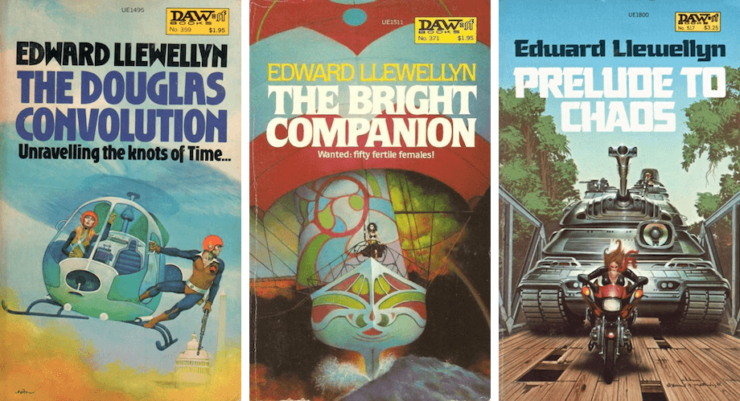
Edward Llewellyn’s Douglas Convolution series (The Douglas Convolution, The Bright Companion, and Prelude to Chaos) imagines the development of a marvellous chemical with applications to chemotherapy, birth control, even insecticides. There was one unexpected consequence: It sterilized females3 whose mothers had been exposed to the chemical. The world fertility rate plummeted. Societies went extinct, or adapted in nasty ways. But hey, tangerines were cheap before everything collapsed.
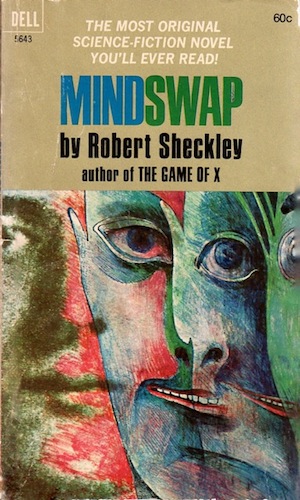
A number of authors have looked at the demands of physical spaceflight and rejected it in favour of less demanding (and as far as we can tell, completely impossible) mental transference. Why send the body when you can just beam (somehow) the contents of someone’s head into a waiting body on the other end?
Robert Sheckley’s absurdist Mindswap provided one answer: you wouldn’t want to do this because mind transfer is a handy tool for the glib conman. Deliver the right line of snappy patter and you could walk away with a healthy new body, while your victim finds himself trapped in a decrepit loaner body.
Richard Morgan’s Takeshi Kovaks stories suggest even darker possibilities; give the rich the ability to gentrify poor people’s younger, healthier bodies and they will. Limit the victims to prisoners…well, who do you think owns the people who write the laws?
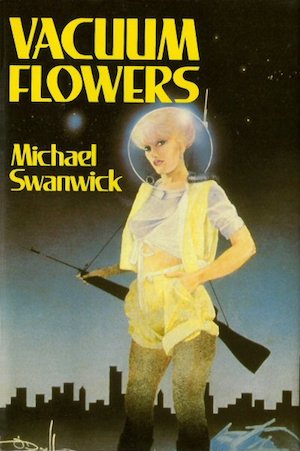
On a related note, high-speed communication seems to be getting ever higher speed (subject to the limits imposed by physical law). But what happens when information can be transferred from one person to another so quickly that it becomes hard or impossible to say where one person ends and another person begins? To communicate means to merge.
In Michael Swanwick’s Vacuum Flowers, the backstory is that the entire population of the Earth collapsed into the Comprise mass-mind. Only the humans far away enough from Earth that there is severe communications lag have resisted assimilation. The Comprise cannot function when time lags become too large.
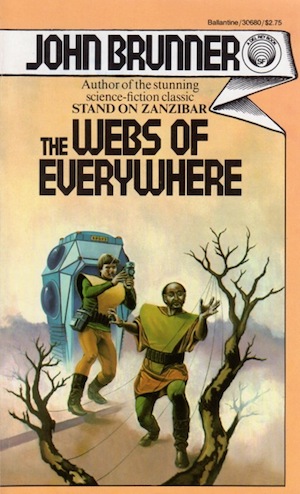
Teleportation seems like it would be pretty darn handy. Step into a booth here, step out half a planet away. In John Brunner’s The Webs of Everywhere (originally published as Web of Everywhere), teleportation devices, called Skelters, proved to be easy to build and therefore impossible to regulate. It took a while for people to realize that there was a downside to making Skelter addresses as public as old-fashioned landline numbers. Consequences: epidemics, terrorism, et cetera. The human population drops to a third of its pre-Skelter level.
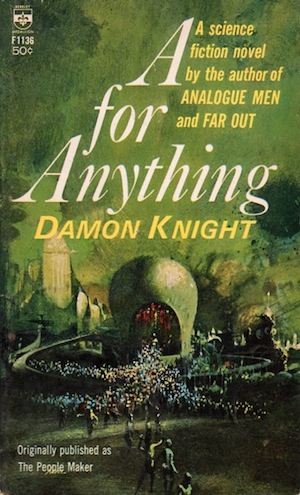
Matter duplication would be keen, wouldn’t it? Each sumptuous meal can become a feast for thousands; each car a fleet! As economies are not built to deal with limitless goods, the invention of matter duplication is usually followed by widespread economic and social disruption, as seen in George O. Smith’s classic “Pandora’s Millions.” But Smith’s characters were lucky, because Smith was a comparatively benevolent author. Damon Knight’s A for Anything (also published as The People Maker) pointed out that one could run off lots of copies of useful servants. If one of them rebels…hit the delete key. Lots more where he came from.
A real-life example: I got into book reviewing just about the time ubiquitous cell phones became a thing. Watching mystery writers grapple with the fact that a myriad of stock plots no longer worked if the characters could just reach into their pockets for a phone was quite entertaining. Of course, the downsides of ubiquitous cell phones had been predicted as early as—I bet you all think I am going to mention that scene in Space Cadet where the lead puts his phone in his suitcase to avoid unwanted calls, don’t you?—1919, in this visionary article. Not that it stopped anyone from creating the devices. Which is reassuring, because it means that no matter how many warnings SF authors provide about unintended consequences of technology, we’ll always have to deal with the side effects of tomorrow’s new shinies.
In the words of Wikipedia editor TexasAndroid, prolific book reviewer and perennial Darwin Award nominee James Davis Nicoll is of “questionable notability.” His work has appeared in Publishers Weekly and Romantic Times as well as on his own websites, James Nicoll Reviews and Young People Read Old SFF (where he is assisted by editor Karen Lofstrom and web person Adrienne L. Travis). He is surprisingly flammable.
[1]Of course, one gee forever is pretty unreasonable or at least it implies power generation and waste heat management abilities most authors don’t want to tackle. The social consequences of being able to cram a Pickering A into something the mass of a full backpack must be pretty extreme.
[2]Discounting generation ships, which are usually deathtraps.
[3]I say “female” not because I am one of those male fans whose comments about women suggest that those fans are cosplaying Ferengi, but because I cannot see any reason for the effects to be limited to humans. Which, given how widely the chemical was used on crops, implies unfortunate effects on the world’s ecosystems.










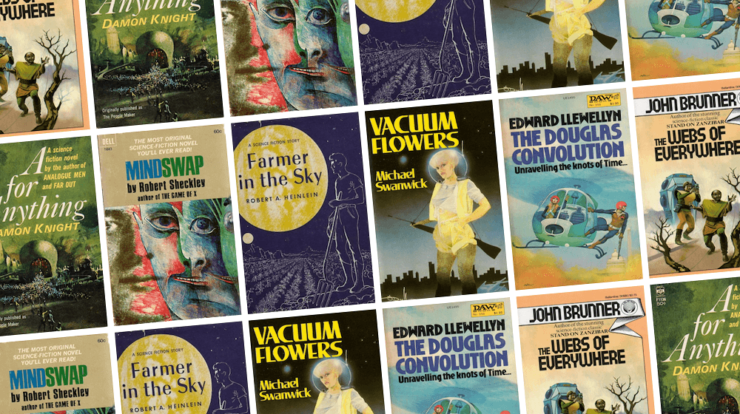
It’s interesting to compare and contrast my phone with my cpap. My new phone lacks a number of features my old phone had (the ability to jump music forward a track by pressing a button on the side, and volume control is likewise dependent on actually opening the phone). My cpap otoh is a step up over the old one, which was an improvement over my first one. My suspicion is that one followed the philosophy that customers should like what is offered them, whereas the other had actual users involved in the redesign.
The part where my cpap now provides my supplier with real time information on my sleep habits is in no way creepy.
I would think the real time sleep data would be protected under the Canadian version of HIPAA.
On-topic: Pretty much any SF work set in a post WW3 future is showing the downsides of a new technology.
Well, sure, if you don’t focus on the huge boost to the coffin and house-building industries. The increase in bereavement card revenue alone could justify a small nuclear exchange.
Strictly speaking, is it even a downside when a new technology for killing people kills people?
Depends if the people being killed are the ones the weapon is aimed at or the ones doing the aiming. Messerschmitt Me 163 Komets, for example, were great planes if you wanted to reduce a succession of pilots to organic slurry but not that great at giving Germany dominance of the skies.
@2: It’s worse than that; the data from CPAP and many other medical devices is protected with DRM from being accessed by the patient. This protection (which desperately needs to be challenged in court) is put in place by the device manufacturer. Fortunately there are FOSS hackers …
I should count myself lucky that I’m allowed to see my own blood glucose readings. No doubt Abbott would love to eliminate that access.
I think Farmer in the Sky doesn’t quite fit. As I recall, Heinlein never showed the risks of torchships. I thought you were going to mention the shield that held in the atmosphere which wasn’t quite as reliable as hoped.
You’ve tapped into a large topic. It might be possible to divide authors into a group where technology mostly works (Heinlein) vs. those where it mostly doesn’t work (Sheckley). What was the Sheckley story where the man uses the psychotherapy machine which is tuned for an alien species? Or the Laxian key about a machine which turns anything into alien food (which solidifies into building material) but no one knows how to turn it off?
Does this discussion include weapons (which generally work as intended) and con jobs (aliens give humanity teleportation (?) which is gradually using up the solar system’s rotational momentum– A Signal Shattered by Eric Nylund and sabotage (“The Education of Trigress McCardle” in which extremely difficult robot babies intended to discourage irresponsible parenthood turn out to be a Chinese plot)?
There may be privacy laws that apply but what are the odds they are enforced?
I get to see a number of sleep parameters, which has given me the useful and somewhat counter-intuitive information that of usage hours, mask seal, apnea events per hour and mask off events, the one that has the most direct effect on cognition is usage hours, with apnea events a distant second.
The new machine also hectors me with maintenance messages but since the ergonomics of the device dictate that the read out be placed on the wall side this does not inconvenience me.
The shield is a bit outside what I meant because when it works, it makes life better. Heinleinian regrettable tech is stuff like the mobile phones that cannot be turned off (inspired, i think, by a feud RAH had with the phone company) and that infallible lifespan predictor device from Life Line.
Pickering A is a nuclear reactor.
Is it licensed, and are you trying to defeat a 50 foot tall marshmallow man?
This whole “burning organic material for heat and other energy” thing is turning out to have some downsides, too.
It is indeed licensed. So, fun fact for everyone who knows what a Nicoll Event is: my father’s specialty was heat transfer, and the results from his work on two-phase flow were and I believe still are used in nuclear reactors across North America.
“Of course, the downsides of ubiquitous cell phones… I bet you all think I am going to mention that scene in Space Cadet where the lead puts his phone in his suitcase to avoid unwanted calls, don’t you?”
I am not sure that is a downside. And I don’t remember that passage, but I do remember that a character in Heinlein’s Lost Legacy, written much earlier, does almost exactly that. And in Between Planets the hero takes a call while he is out riding in the desert.
Mindswap was pretty entertaining.
I like FM Busby’s “The Breeds of Man”, where it initially appears like the Luddites were right, with the hastily released cure for HIV leading to sterility, and the cure for the sexually transmitted sterility leading to any children born being hermaphrodites (they fully change sex from month-to-month), all of which scares the adult generations throughout the book. Then we follow through to the epilogue, and the kids are just damn well fine with it all and think it is better. The Luddites were right, until they were wrong.
There are no female or non-binary authors who have written novels that fit this “SF Works That Show the Downside to New Technology” criteria?
When i was writing this, i was aware of the imbalance and yet for some reason i could not think of examples by women and non-binary authors. now that it is too late, of course, now i can; Cherryh’s azi show the hazards of being able to make bespoke people, and Leckie shows how being able to run multiple instances of a person can go horribly wrong.
My interpretation of Asimov’s Robot Novels (especially Robots and Empire) is that Asimov had reluctantly come to a similar conclusion: The Robot Servant, being the personification of all that we wish from our technology, is good for the individual but bad for society. And since humankind needs a healthy human society to be able to live a human life, the Robot (and perhaps to a lesser degree all science and technology) is ultimately bad for individuals as well.
It all began to go downhill when we invented agriculture, which transformed the convivial, democratic, and egalitarian hunter-gather bands into authoritarian, slaveowning, warlike societies.
But of course there’s no going back. We’ll just have to try to make technology work for us, and hope it doesn’t all end badly.
The other day I commented that ominous stories about AI taking over depend on all of us pretending that AI currently works at all; I was having that thing where I bought something online, only to be inundated for days by ads for the thing I’d just bought. Thus far learning algorithms largely result in contracting feedback loops of information, but more and more widely broadcast.
A few hours later I happened to read Watchbird by Robert Sheckley, on more or less that same topic from 1953. Not bad prognostication.
Amazon’s AI does a very good job of recommending things for me to read, using the logic of “people who bought this also bought this”. On the other hand YouTube does a horrible job of recommending videos, as it apparently is only able to use the logic of key words and cannot search by meaning.
I use protonmail to keep gmail out of my mailbox. I use google search but don’t sign in.
And I don’t use facebook or twitter. If I had an online business I would, but I wouldn’t put any personal content on there.
I only get plagued by ads when I use google on my phone to search with. As a consequence I only use my phone as a phone, except in the rare circumstance when I need directions.
@20. Beta : I run at least one ad blocker on any browser I use, sometimes two. Had to laugh when one blocker, designed for, you know, blocking tried to convince me that “Acceptable Ads (meaning: those from corps and people that pay us to let them thru) are not annoying and do not interfere with the content you are viewing.” Sure, all the flashy, auto-playing videos and ads are fun…
Also, I’m not a reactionary, but I do indeed “object to mandatory software upgrades on the specious ground that everything they do, they do less well than the previous release.” Heh. The latest Windows 10 upgrade crashed my computer all weekend, then undoing itself, till it finally worked. Microsoft engineers seem to be getting worse, not better.
Re: Vacuum Flowers, a similarly sinister take on, umm, augmented individuality and communication (?) is Join by Steve Toutonghi. The Joins are chains of brains linked while in separate bodies…many many downsides and some terrific upsides. A serial killer novel with a major twist, how can a killer hide in a society where chains of consciousness are the norm?
I likeded it a real lot.
IIRC the people in George O. Smith’s matter-duplication society were just as unlucky as those in Damon Knight’s novel, at least in the last of the Smith stories.
In Smith’s “Identity” we learn that people can be duplicated, but the duplicates are not considered to be human. So if a surgeon needs to perform a tricky operation on you, the surgeon will run off a few copies of you and vivisect them until they die in order to perfect the operation. And if any of the duplicates survive, they are of course put down.
Stanislaw Lem addressed Disastrous Inventions (or uses of inventions) and Inventor F-Ups in many of his humorous short stories in the “Trurl and Klaupacius” (Cyberiad, US title) and “Ijon Tichy” (Star Diaries, US title) series, as well as in his novels.
I note that the likes of George O. Smith and Damon Knight seem to have been living and writing in a fascinating parallel universe where the burgeoning field of medical ethics followed the kindly and humane guidelines prescribed by Dr Mengele. (A more realistic take, even in the 1950s environment that considered the likes of Stanley Milgram’s obedience to authority experiment to be fine and dandy, is that medical ethicists might just have balked at some of these plot tropes …)
But that’s not what I came here to say.
Rather: yes, cellphones (and now smartphones) have posed a real headache for any number of horror and crime stories. But by the same token, they enable lots of new plots. One that springs to mind is “Dead Air” by the late Iain Banks (no “M”) — a thriller that relies entirely on the existence of cellphones insofar as the plot simply wouldn’t work if you removed cellphones and SMS messaging from the universe. I’m now thinking about SF: what books have plots that rely on unexpected positive second-order side-effects of technology initially perceived as having no up-sides? (Example: our continuum, in which an unexpected side-effect of the existence of nuclear weapons has been that for 75 years and counting the great powers were too scared to actually re-start the permanent floating world war again.)
Yet. We’ve had long pauses between world wars before.
The best exploration of unanticipated downsides to new technology for the cellphone is not SF, but The Wire. The gangs use pagers and pay phones, the pigs learn to spy on those; so they use codes (which have to be simple enough for a gang-banger with minimal education to apply); the pigs break the codes. And then a long chain of better phone use strategies and the pigs trying to get on top of those. If the show had continued to the present, they’d have a war of crypto chat systems.
Niven’s teleportation booths come after disease is mostly ended, but still has a soft apocalypse of American mall-ifying the planet. Everyone learning to teleport in The Stars My Destination means nobody has any privacy, except if they hide their houses under complex mazes, and the end gives every crazy person destructive power.
The mind-swapping’s also a major part of Sheckley’s Immortality, Inc., and has an even more grim attitude towards mind-swapping and survival of the rich.
Pratchett & Baxter’s The Long Earth has a trivially simple device for paratime travel, which just can’t carry iron across (ahem blood). So people staying on Earth 0 have to make “moats” on Earth -1/+1 for security, otherwise any traveller can rob them by just walking in. Everyone who can tolerate leaving does so, and has to live initially in barbaric squalor, but free. Earth 0 gets pretty empty and unpleasant about travellers, and eventually technology & states form out in the parallels.
That should actually be a common downside to any tramp spaceship future as well: If ships are cheap, and other planets are even remotely reachable and habitable, Earth’s going to be abandoned to the most conservative, awful, homebody people. It’ll be a wasteland with a few malls, mall cops, and Applebees playing country music.
Alternatively, Earth will be the home of civilization while ten thousand cults, crazies and Dunning-Kruger survivors explore all the fun ways small, isolated, communities can go horribly, horribly wrong. Imagine a sky full of Pitcairn Islands.
There was a John Brunner where humans found an abandoned alien starport with a billion working starships. Cue the migration and subsequent die-backs.
Heinlein, iirc, had both the overcrowded Earth and the sky full of Pitcairn Islands.
One of the minor ironies of SF is Heinlein, who spent his life in the nation where he was born, lauded people who emigrated, while Shute, who thought anyone could prosper if they were in a colony while doing it in the context of the home country took real grit [1], emigrated.
1: There used to be an acronym for this: FILTH aka failed in London, try Hong Kong.
Farmer in the Sky shows the perils of depending on just one power plant to keep your moon habitable. And the colony had only one surface to orbit shuttle. I wondered why people of the future had forgotten the need for redundancy in critical systems.
@31,
Isn’t that characteristic of hi tech? The Cassini probe doesn’t have an alternate power source. My guess is that if in Star Trek the Lithium crystals go, then so do the heating elements and food replicators.
Come to think of it, who among us has a redundant system for the delivery of fresh water?
You don’t have an alternate source of water? Did you learn nothing in the Winter of 1963? (Harumphs into beard and waves cane a bit)
You mean when we all had to pee in a bowl with a covered lid, leave it outside overnight, and then lick the condensation off the lid?
Yes, I remember. Only those of us who understood thermodynamics survived !
James @30, Noel Coward described Singapore as “a first-rate place for second-rate people.” By “people” he meant the English, of course.
One unexpected side effect of cell phones was public knowledge about abusive police.
I once mentioned I keep an emergency supply of water (just after an excessively exuberant construction company sheered through a major water main, dropping water pressure across a large swath of the city where I live) and someone immediately deduced I grew up on a farm. Which is true but it was losing water in ’63 that led to the habit, not our badly designed pump house* on the farm. Is keeping emergency water actually a farm thing?
* Subterranean, accessible only by a ladder of dubious solidity, prone to flooding and freezing in the winter, and with a fuse box held up by a shovel jammed under it. The water never quite got to the box. A couple of times a year someone, never my dad, would have to descend into ice water a few inches below that box and hold a candle under one particular bit of the pump until it unfroze.
We still have emergency water, though it’s never been out as long as we’ve lived here (now, the power goes whenever a seagull flies into a transformer box, or some drunk in a car runs into one–long story, and no, it wasn’t me).
But I really wanted to mention Arthur C. Clarke’s story “Superiority” about the possible problems with too much tech change in the middle of a war–it’s available online for free at http://www.mayofamily.com/RLM/txt_Clarke_Superiority.html.
@27 Why do you assume that the homebodies will be awful? At my age, I’d be very unlikely to emigrate, although I might encourage my Son to do so. And I don’t think I’m awful. At least, I very rarely yell at the neighbor kids to get off my lawn.
On the other hand, I don’t think there’s been a good software update since around 1997. The Classic Mac OS was the height of usability and everything since has been going backwards or forwards into new manners of obscuring computer function.
Give me a phone with an actual dial, any day.
@31 I don’t think they had forgotten. But cost was clearly a very big issue in the structure/management of the colony and the decisions were made on Earth, not on Ganymede. So the engineers probably said, “We need three of these.”. The pencil pushers said, “One will run the shield. You’ll get one.” And the pencil pushers didn’t revisit their decision until cheaping out almost destroyed all their investment up to that point.